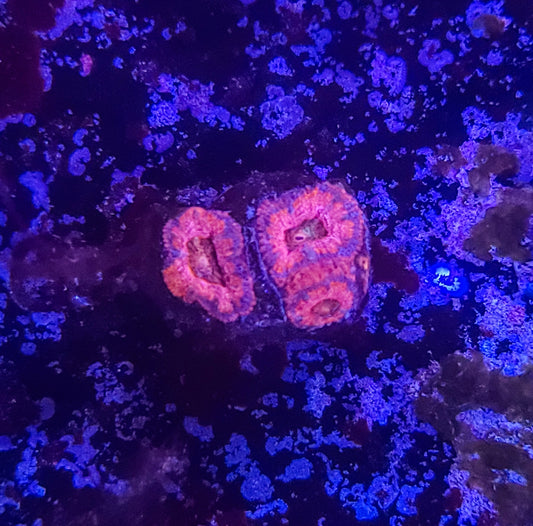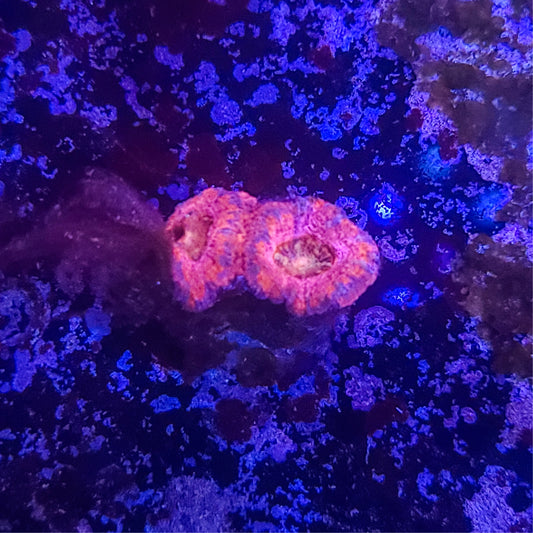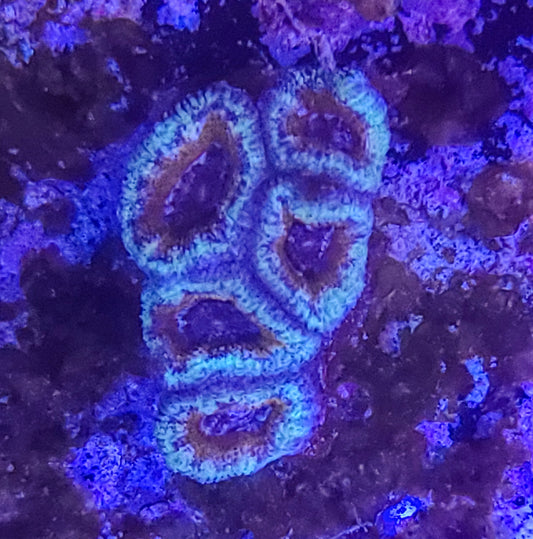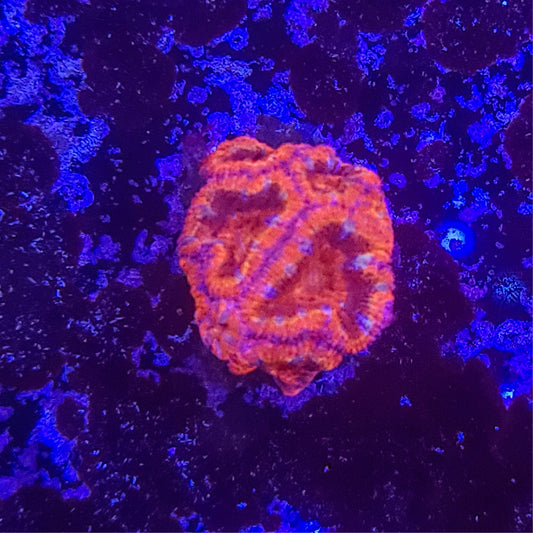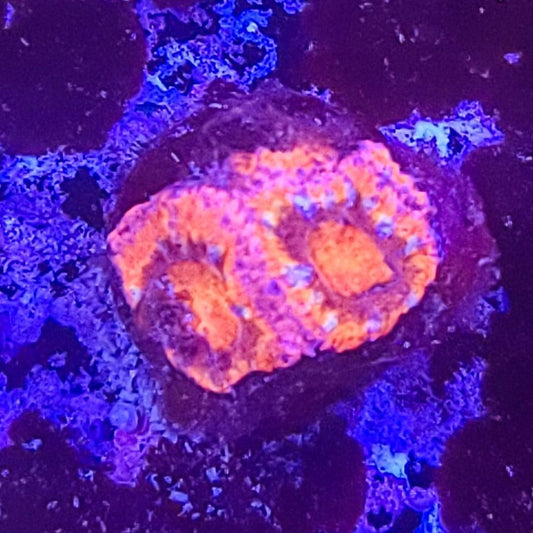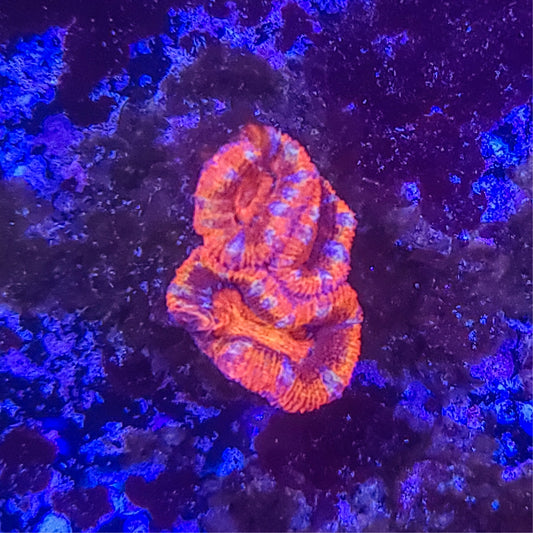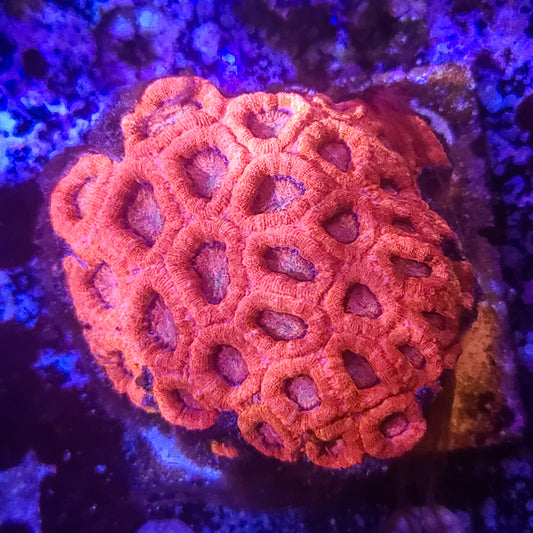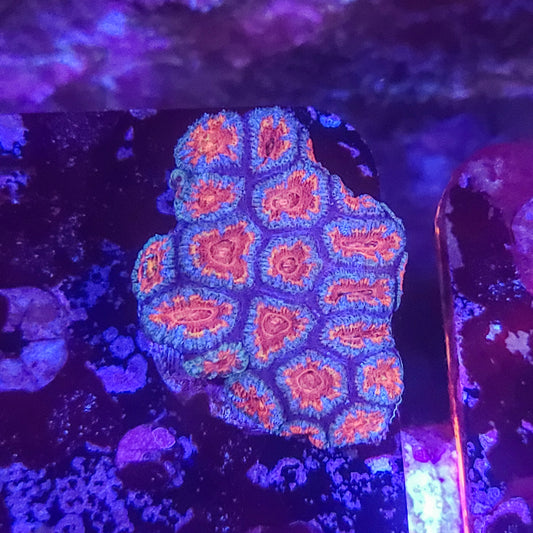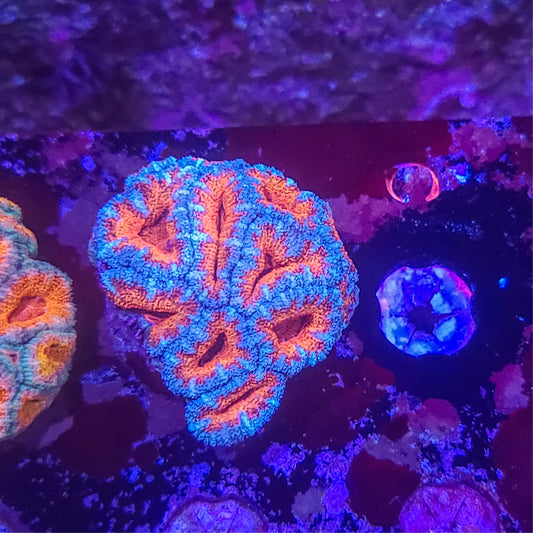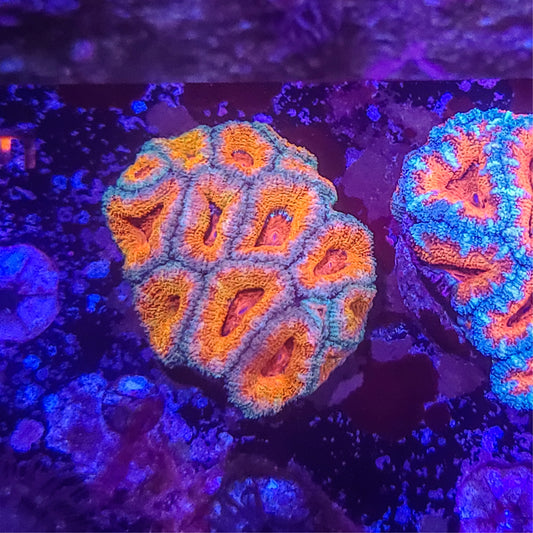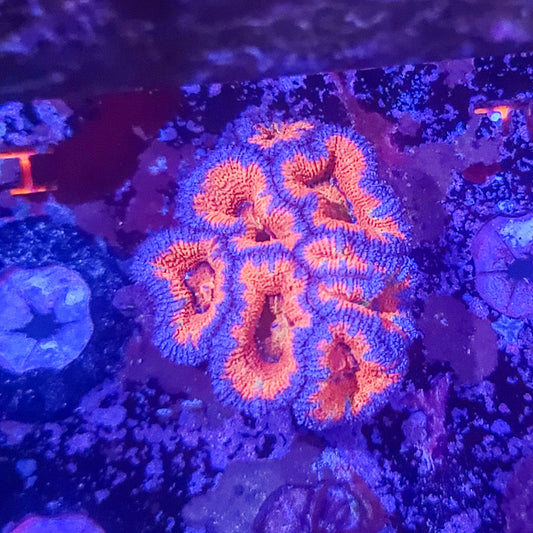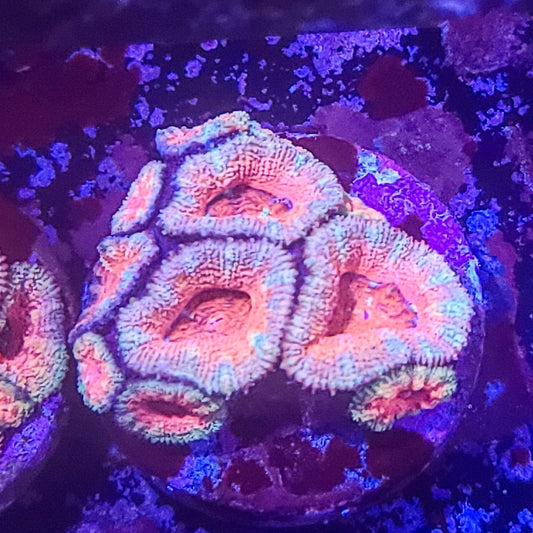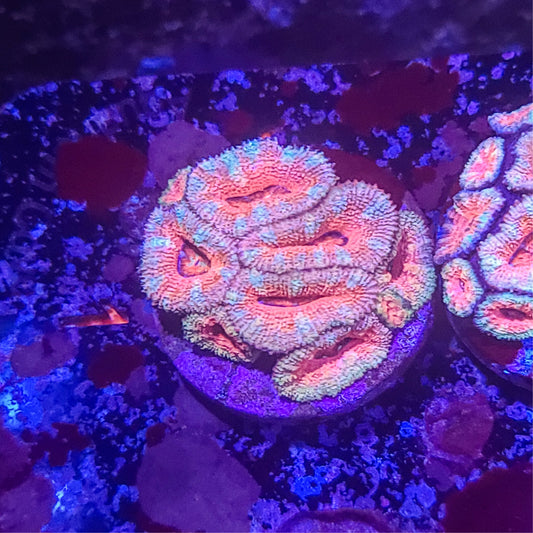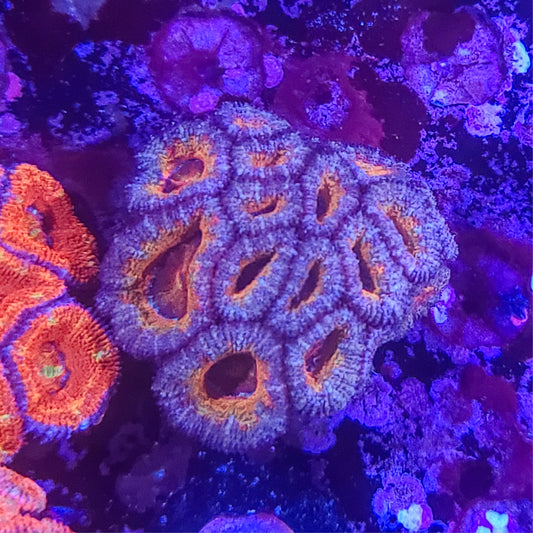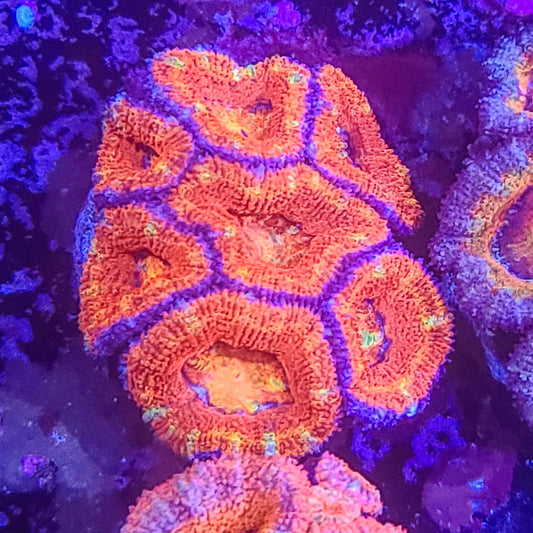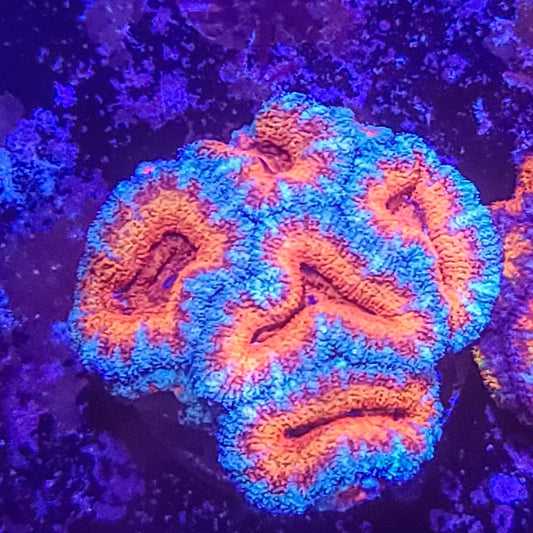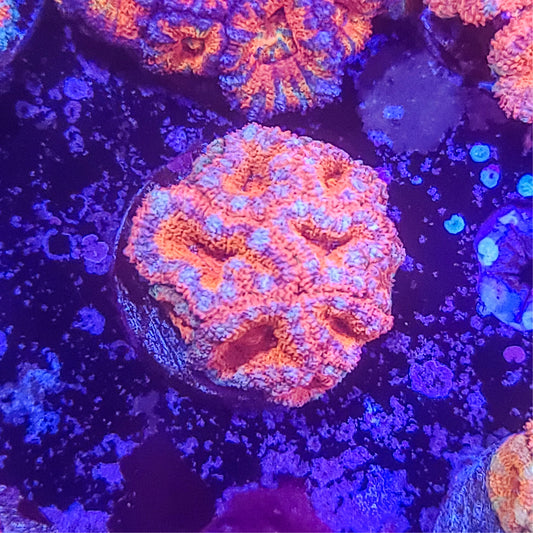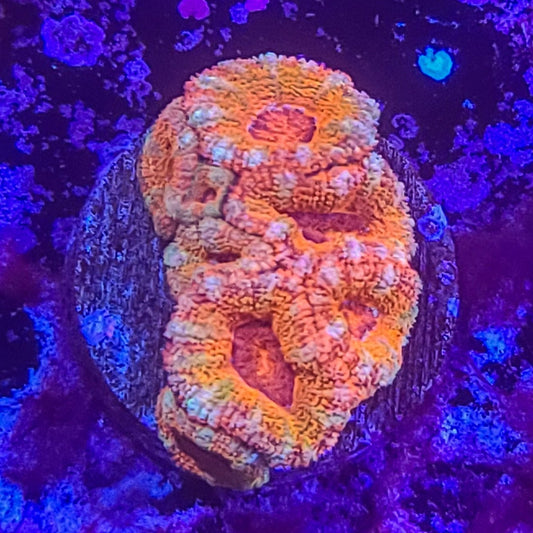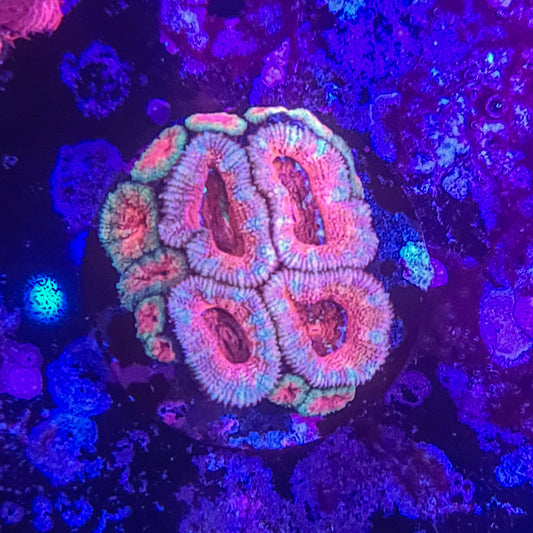Collection: Intermediate
Intermediate level corals are the perfect stepping stone between the forgiving nature of beginner species and the much more demanding requirements of expert-level specimens. These corals offer beauty, unique characteristics, and moderate care requirements that provide an excellent opportunity to develop advanced reef keeping skills.
Please browse our intermediate coral selection below. If you have questions, please contact our team online or by phone at 920-385-4802 to help you take the next step in your reef keeping journey.
-
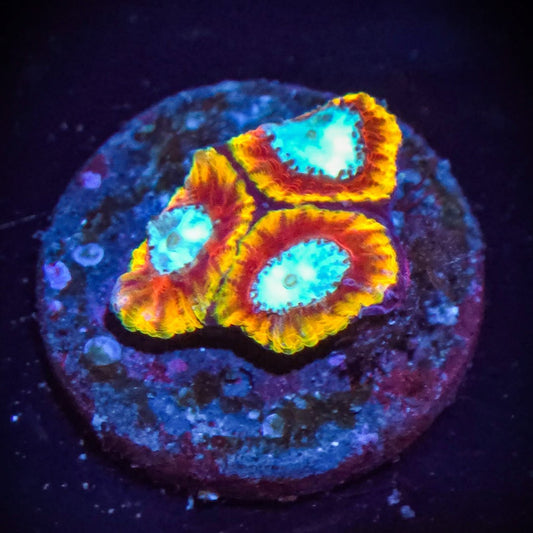 Sold out
Sold out -
AC Pink Micromussa WYSIWYG
Regular price $39.99Regular priceUnit price / per -
SA Pink Pulse Acan 011 1C
Regular price $69.99Regular priceUnit price / per -
SA Pink Pulse Acan 011 1D
Regular price $62.99Regular priceUnit price / per -
SA Ion Cannon Acan 011 2C
Regular price $89.99Regular priceUnit price / per -
SA Lava Lamp Acan 014 3C
Regular price $119.99Regular priceUnit price / per -
Acan: Reaching for Joy 014 4B
Regular price $49.99Regular priceUnit price / per -
Acan: Futile Thoughts 014 5B
Regular price $49.99Regular priceUnit price / per -
SA Crown of Roses Acan Colony 014 10F
Regular price $197.99Regular priceUnit price / per -
Acan: Paths of Blue 021 1A
Regular price $129.99Regular priceUnit price / per -
Acan: Orangalated 021 1D
Regular price $69.99Regular priceUnit price / per -
Acan: Orange Huddle Mini Colony 021 1E
Regular price $119.99Regular priceUnit price / per -
Acan: Chaos Imagination Mini Colony 021 1G
Regular price $89.99Regular priceUnit price / per -
Acan: Planets of Pastel 021 1I
Regular price $119.99Regular priceUnit price / per -
Acan: Pink Onlookers 021 1J
Regular price $79.99Regular priceUnit price / per -
Acan: Razzle Mini Colony 021 3B
Regular price $149.99Regular priceUnit price / per -
Acan: Sizzle 021 3C
Regular price $141.99Regular priceUnit price / per -
Acan: Blue Fences 021 3G
Regular price $89.99Regular priceUnit price / per -
Acan: Connections 021 4F
Regular price $59.99Regular priceUnit price / per -
Acan: Wheels of Desire 021 5E
Regular price $139.99Regular priceUnit price / per -
Acan: Pastel Iterations Mini Colony 021 8B
Regular price $149.99Regular priceUnit price / per -
Acan: Sea Foam Trap 022 1J
Regular price $69.99Regular priceUnit price / per -
Acan: Snuggles 022 2J
Regular price $89.99Regular priceUnit price / per -
Acan: Super Powers 022 3J
Regular price $49.99Regular priceUnit price / per
About Intermediate Level Coral Keeping
At Sanctuary Aquatics, we want to help you take the next step into more advanced aquarium keeping! Intermediate coral keeping is an exciting phase in the reef keeping journey where hobbyists have mastered the basics of water chemistry, calcium, and alkalinity; lighting, and water flow while developing the confidence to tackle more challenging species. This stage is characterized by a deeper understanding of coral biology, more precise parameter monitoring, and the ability to recognize and respond to coral health indicators.
Intermediate corals typically require more stable conditions than beginner species, may have specific lighting or flow preferences, often benefit from targeted feeding, and overall, can be more sensitive to parameter fluctuations. However, they are still forgiving enough to recover from occasional mistakes, making them ideal for hobbyists ready to expand their skills without risking catastrophic losses.
The transition to intermediate corals often coincides with equipment upgrades, more sophisticated monitoring systems, and a deeper commitment to the hobby. This is the stage where many reef keepers discover their preferred coral types and begin developing specialized tanks focused on particular coral families or regions.
Characteristics of Intermediate Corals
- They require moderate to good water quality: with more attention to stability than beginner corals, but are not as demanding as expert-level species. Most intermediate corals benefit from supplemental feeding and respond well to proper nutrition programs.
- These corals often have specific placement requirements based on their lighting and flow preferences: requiring hobbyists to understand PAR levels and water movement patterns within their tanks. It’s also worth noting that many intermediate species exhibit aggressive tendencies, so they’ll need more thorough research to better understand compatible species and how to provide adequate spacing.
- Intermediate corals frequently display more vibrant colors and unique growth patterns: than beginner species, rewarding proper care with spectacular displays. They also tend to be more responsive to environmental conditions, showing clear signs of happiness or stress that help hobbyists fine-tune their care techniques.
- Perhaps most importantly, intermediate corals provide excellent learning opportunities: They teach valuable skills in coral observation, feeding techniques, water parameter management, and problem-solving that prepare hobbyists for eventually keeping the most demanding species.
Intermediate Level Coral Species to Add to Your Reef Tank
Acanthastrea (Acan Corals)
Acan corals are some of the most colorful and sought-after LPS corals in the hobby, making them excellent intermediate corals to choose! These corals require careful attention to lighting conditions, as intense lighting can cause dramatic color morphing while proper spectrum control maintains their prized rainbow varieties.
Acan corals thrive in moderate lighting (25–50 PAR) with placement on the sand bed, and their semi-aggressive nature requires at least 6 inches spacing from neighboring corals. What makes these corals particularly rewarding to care for is their enthusiastic feeding response—they eagerly consume meaty frozen foods such as mysis shrimp when tentacles are extended, making them perfect for developing target feeding techniques that promote rapid growth and vibrant coloration.
Favia & Favites (Brain Corals)
Favia and Favites corals, commonly known as “brain corals,” represent classic intermediate LPS species that offer stunning variety in colors and patterns. These corals can be grown successfully under a wide range of lighting conditions (30–150 PAR) but require careful observation to prevent bleaching.
Known for their aggressive nature with long sweeper tentacles, they're perfect for learning coral warfare and spacing techniques, while their feeding behavior—accepting pellets directly on their mouths—demonstrates the dramatic growth improvements possible with proper feeding using powdered plankton and frozen foods.
Euphyllia (Advanced Varieties)
While basic Euphyllia species like standard Hammer and Frogspawn corals are often considered beginner-friendly, high-end Torch corals are examples of more intermediate level coral specimens. Torch corals, particularly those with unique colorations, can be more demanding than their Euphyllia cousins since they require more precise lighting and flow conditions.
Torch corals are great for those wanting to learn more about proper coral spacing, since they have aggressive sweeper tentacles. Keeping Torch corals will help aquarium enthusiasts further develop skills in recognizing optimal extension and health indicators.
Chalice (Echinophyllia, Mycedium, Oxypora)
Chalice corals are beautiful LPS corals with colorful bodies that need low light conditions and can lose their coloration if subjected to excessive lighting, which is easily done with modern, powerful LEDs.
Despite their specific lighting requirements, they remain hardy enough for intermediate keepers and will accept aquarium foods such as pellets, making them excellent for practicing targeted feeding techniques.
Blastomussa
Blastomussa corals (or Blastos) are an excellent intermediate choice thanks to their moderate care requirements and spectacular appearance. These species are appreciated for their colorful polyps and tend to happily thrive even when other corals might be struggling.
Blastos are not overly demanding regarding light and flow requirements. This makes them relatively forgiving while still equipping aquarium enthusiasts with more robust knowledge and experience in LPS coral care and feeding.
Goniopora & Alveopora (Flowerpot Corals)
Goniopora, or Flowerpot corals, have historically had a reputation for being difficult to maintain long-term, though some hobbyists have achieved success with proper care. Alveopora is more hardy than the related Goniopora coral but can still be somewhat delicate, requiring careful attention to feeding and water quality.
Duncan Coral (Duncanopsammia axifuga)
Duncan corals are also great for beginner coral tanks, but their excellent hardiness and moderate growth make them outstanding intermediate specimens also. Their forgiving nature combined with their responsiveness to feeding makes them perfect for developing LPS care skills.
Scolymia
Scolymia are large, fleshy single polyps that are among the most highly desired LPS corals due to their vibrant color patterns. These massive corals offer aquarium keepers plenty of experience in proper placement, feeding techniques, and patience, as they are extremely slow-growing but spectacularly rewarding specimens.
Trachyphyllia (Open Brain Coral)
Trachyphyllia corals are generally considered easy enough to keep and offer some of the most stunning rainbow colors available, though premium specimens can be quite expensive. They help intermediate keepers develop skills in single-polyp coral care and feeding.
Plate Corals (Fungia Species)
Long tentacled plate corals are fairly hardy corals that do well under moderate to bright lighting and low to moderate water flow. These corals teach important lessons about proper substrate placement and help develop understanding of coral mobility and feeding behaviors.
Advanced Soft Corals
While most soft corals are beginner-friendly, certain species like premium Leather corals, rare Zoanthid morphs, and specialty soft coral varieties can provide intermediate challenges. These corals help bridge the gap between basic soft coral care and more demanding stony coral requirements.
Beginner SPS
For those eager to begin their SPS adventure, hardy species like Montipora, Birdsnest (Seriatopora), and certain Anacropora species offer excellent introduction to small polyp stony coral care. These species are robust enough to provide a positive initial experience while offering a glimpse into the rewarding world of SPS keeping.
Care Requirements for Intermediate Corals
Intermediate corals require more attention to detail than beginner species while remaining more forgiving than expert-level specimens. You'll need to know your key parameters by testing alkalinity, nitrate, and phosphate weekly and ideally have at least a rough idea of your tank's PAR levels.
Equipment Considerations for Intermediate Coral Keeping Success
- Water Testing: For more advanced corals, water testing becomes more frequent and precise, with weekly testing of alkalinity, calcium, magnesium, nitrate, and phosphate being standard practice. As such, many intermediate keepers invest in PAR meters to understand their tank's lighting zones and optimize coral placement.
- Lighting: Quality lighting systems with adjustable intensity and spectrum control become more important, as does reliable dosing equipment for maintaining stable calcium and alkalinity levels.
- Protein Skimmers & Other Systems: Protein skimmers, water change systems, and backup equipment become increasingly important as the value and sensitivity of the coral collection increases. Many intermediate keepers also begin implementing quarantine systems to protect their established coral populations.
Tips for Success with Intermediate Corals
- Start with one or two intermediate species rather than completely overhauling your coral selection. This allows you to focus on learning the specific requirements of each new coral type without overwhelming your system or your experience level.
- Develop strong relationships with local fish stores and fellow reef keepers who can provide guidance and share experiences. The intermediate phase is an excellent time to join reef keeping clubs and online communities where you can learn from more experienced hobbyists. At Sanctuary Aquatics, we’re here to help you!
- Document your successes and failures through photos and notes. This helps you recognize patterns in coral health and growth, and serves as a valuable reference for future decisions.
Most importantly, all corals on this list are still fairly hardy and forgiving, so they can come back from the occasional near-death experience, which makes them reasonable candidates for intermediate reefers.
Progression to Advanced Coral Keeping
Intermediate coral keeping serves as crucial preparation for eventually tackling expert-level species like demanding SPS corals, rare specimens, and challenging non-photosynthetic varieties. The skills developed during this phase—precise parameter control, advanced feeding techniques, coral health assessment, and problem-solving abilities—form the foundation for successful advanced reef keeping.
Many intermediate keepers find themselves drawn to specific coral families or geographic regions, leading to specialized tank setups focused on particular biotopes or coral types. This specialization often marks the transition from intermediate to advanced reef keeping.
The intermediate phase is also when many hobbyists begin contributing to coral propagation efforts, learning fragging techniques, and potentially starting to trade or sell coral fragments to fellow enthusiasts.
Get Started with Intermediate Level Corals Today!
At Sanctuary Aquatics, we understand the unique needs of intermediate coral enthusiasts and have curated our selection specifically for hobbyists ready to take the next step in their reef keeping journey. Our experienced team can help assess your readiness for intermediate species and recommend specific corals that match your tank conditions and experience level.
We provide detailed care information for each species and offer ongoing support to ensure your success with more challenging coral varieties. Our goal is to help you develop the skills and confidence needed to eventually tackle any coral species you desire!
Contact our team at 920-385-4802 or online today to discuss your intermediate coral keeping goals and explore our carefully selected specimens that will challenge and reward your growing expertise. As always, be sure to check out our full saltwater coral collection to see all the species we have available for intermediate and advanced reef keepers.



